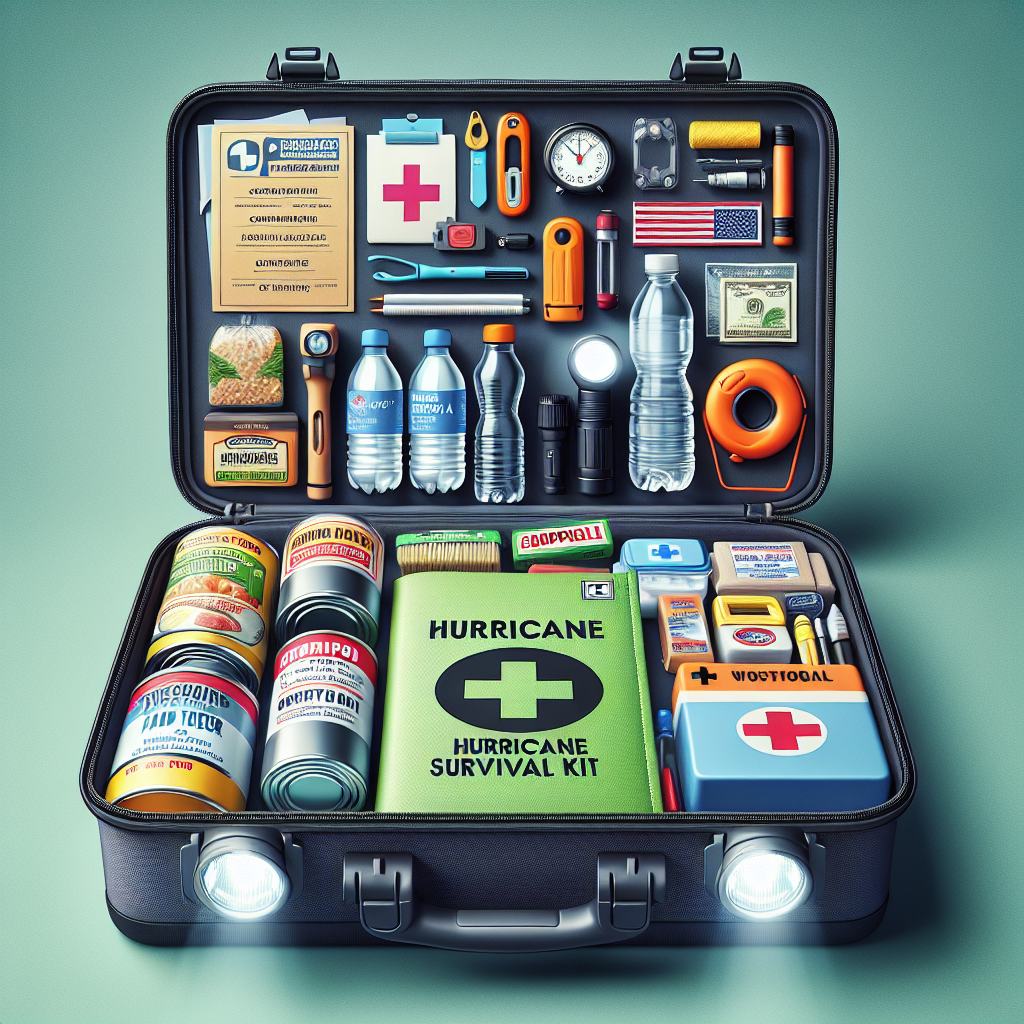Imagine yourself in the midst of a powerful hurricane, feeling the force of nature’s wrath all around you. In this article, we will provide you with essential tips and strategies for hurricane survival. From creating an emergency kit to developing an evacuation plan, we’ll guide you through the steps needed to ensure your safety during these unpredictable and potentially dangerous storms. So, grab a cup of tea and prepare yourself for an informative and friendly journey on how to survive a hurricane.
Preparing for a Hurricane
Understanding Hurricane Categories
When preparing for a hurricane, it is crucial to understand the different categories of hurricanes. The Saffir-Simpson Hurricane Wind Scale is used to categorize hurricanes based on their wind speeds. The scale ranges from Category 1, which has winds of 74-95 mph, to Category 5, which has winds of 157 mph or higher. Understanding the category of the approaching hurricane will help you gauge the potential risks and prepare accordingly.
Creating an Emergency Preparedness Plan
Having an emergency preparedness plan in place is essential to ensure you and your family’s safety during a hurricane. This plan should include a designated meeting place in case you get separated, contact information for emergency services, family members, and neighbors, as well as a communication strategy. It is crucial to discuss and practice the plan with your family members so that everyone knows what to do in case of an emergency.
Building an Emergency Kit
Putting together a well-stocked emergency kit is crucial for hurricane preparedness. Your emergency kit should include essential items such as non-perishable food items, water (at least one gallon per person per day), a first aid kit, batteries, flashlights, a battery-powered or hand-cranked radio, a multipurpose tool, medications, and important documents. It is important to regularly check and update your emergency kit to ensure that all items are in working order and not expired.
Securing Your Home
Securing your home before a hurricane can help minimize potential damage. Start by assessing your home’s vulnerability to high winds and storms. Reinforce windows and doors with storm shutters or plywood, and consider installing impact-resistant glass, especially in vulnerable areas. Make sure your roof is in good condition and secure any loose objects in your yard. It is also important to trim any overhanging branches and clear out debris that could potentially become dangerous projectiles during a storm.
Taking Inventory of Your Belongings
Before a hurricane strikes, it is a good idea to take inventory of your belongings for insurance purposes. Walk through your home and document all valuable items, including electronics, furniture, and appliances. Take photos or videos of each item and keep a detailed list, including their approximate value. This inventory will come in handy if you need to file insurance claims for any damages or losses caused by the hurricane.
Evacuation Preparedness
Evacuation Routes and Shelters
Familiarize yourself with the evacuation routes in your area and determine the safest and quickest way to reach a designated evacuation shelter if necessary. Stay updated with local authorities’ instructions and be prepared to leave promptly if an evacuation order is issued. Make sure your vehicle is in good working condition and has a full tank of gas to ensure a smooth evacuation process.
Determining When to Evacuate
Knowing when to evacuate is crucial for your safety. Pay close attention to local weather forecasts and heed any evacuation orders issued by local authorities. Generally, it is recommended to evacuate if you are in a low-lying area prone to flooding, live in a mobile home, or have been instructed to do so. It is better to err on the side of caution and evacuate early to avoid being caught in hazardous conditions.
Preparing Your Vehicle
If you need to evacuate, it is important to prepare your vehicle ahead of time. Check your tire pressure, fluid levels, and make sure your car’s battery is in good condition. Pack your emergency kit, a full tank of gas, and essential items such as blankets, non-perishable snacks, and a change of clothes. It is also a good idea to have a map in case of GPS failure or limited cell service.
Gathering Essential Documents
Before evacuating, gather important documents such as identification cards, passports, insurance policies, and medical records. Keep these documents in a waterproof and portable container or store them securely in a digital format. These documents are crucial for various purposes, such as accessing medical care, dealing with insurance claims, and proving your identity or homeownership.
Packaging Valuables and Necessities
When evacuating, it is essential to pack valuables and necessities that you cannot afford to lose or that are essential for your well-being. This may include items such as valuable jewelry, sentimental items, prescription medications, and important personal documents. Consider placing these items in a waterproof and sturdy container to protect them from potential damage during transportation or while staying in a shelter.
Staying Safe at Home
Boarding Up Windows and Doors
To protect your home from the strong winds and potential debris, it is important to board up windows and doors. Use sturdy materials such as plywood or storm shutters to cover windows and reinforce doors, especially those with glass panels. Ensure that these protective measures are in place well before the hurricane arrives to allow ample time for installation.
Reinforcing Garage Doors
Garage doors are particularly vulnerable during strong winds and can be easily breached, causing significant damage to your home. Reinforce your garage door by installing a bracing system or strengthening the existing structure. If your budget permits, consider investing in an impact-resistant garage door that can withstand high winds.
Trimming Trees and Removing Debris
Before a hurricane strikes, it is essential to trim trees and remove any dead or overhanging branches that could potentially fall and cause damage to your property. Clear your yard of any loose items such as lawn furniture, toys, or gardening equipment that could become airborne projectiles. Properly secure or store these items indoors to prevent them from causing harm during the storm.
Shutting Off Utilities
To prevent potential hazards during a hurricane, it is important to shut off utilities such as electricity, gas, and water. Familiarize yourself with the location of the main shut-off valves and switches for these utilities in your home. If instructed to do so by local authorities, turn off the main power switch and shut off the gas at the source. Additionally, turn off individual appliances and unplug electronic devices to protect them from potential power surges.
Identifying Safe Interior Spaces
Designate safe interior spaces in your home where you and your family can seek shelter during the storm. Ideal locations include windowless rooms on the lowest floor of your home, such as bathrooms or closets. Avoid areas with large or vulnerable windows and try to choose a space away from exterior walls. Stock this area with essential supplies such as flashlights, batteries, and a battery-powered radio to stay informed during the storm.
Surviving the Storm
Monitoring Weather Updates
During a hurricane, it is crucial to stay updated on the latest weather updates and advisories. Use a battery-powered or hand-cranked radio to listen to local news or have a reliable weather app on your phone. Be prepared to adjust your plans or take necessary actions based on the information received.
Staying Indoors and Away from Windows
To ensure your safety during a hurricane, it is important to stay indoors and away from windows. Strong winds and flying debris can cause significant damage and pose a threat to your well-being. Seek shelter in the designated safe interior space you identified earlier and avoid going outside until local authorities have given the all-clear.
Using Battery-powered Devices
In the event of a power outage, rely on battery-powered devices such as flashlights, lanterns, and radios to meet your basic needs. Make sure you have an ample supply of batteries and keep them in a centralized location for easy access. Consider investing in a portable phone charger or power bank to keep your mobile devices charged.
Water and Food Storage
Stock up on an ample supply of water and non-perishable food items before a hurricane hits. Store at least one gallon of water per person per day for a minimum of three days. Choose foods that do not require refrigeration or cooking, such as canned goods, granola bars, and dried fruits. Don’t forget to pack a manual can opener in your emergency kit.
Staying Hydrated and Nourished
During and after the storm, it is important to stay hydrated and nourished. Drink plenty of water to prevent dehydration, especially in hot and humid conditions. Consume non-perishable food items from your emergency kit to maintain your energy levels. Avoid consuming food or water that may have come into contact with floodwater, as it can be contaminated and cause illnesses.
After the Storm
Assessing Damage and Safety Hazards
After the storm has passed, it is vital to assess the damage to your property and identify any safety hazards. Be cautious of downed power lines, gas leaks, and structural damage. If you suspect any of these hazards, leave the area immediately and contact the appropriate authorities for assistance.
Beware of Electrical Hazards
In the aftermath of a hurricane, electrical hazards are common due to power outages and damage to electrical systems. Avoid touching electrical wires or equipment that may be wet or submerged in water. If you notice any electrical malfunctions or suspect damage, contact a licensed electrician for assistance.
Dealing with Flooding and Water Damage
Flooding and water damage are common consequences of hurricanes. If your home has experienced flooding, it is important to act quickly to minimize further damage and prevent mold growth. Remove any standing water, open windows and doors for ventilation, and contact professional water damage restoration services if necessary.
Checking on Neighbors and Loved Ones
After a hurricane, it is essential to check on your neighbors and loved ones to ensure their safety and well-being. Keep a lookout for those who may need assistance, especially the elderly, disabled, or those with limited mobility. Offer help and support, and notify authorities if anyone is in immediate danger or needs medical attention.
Contacting Insurance Companies and Documenting Losses
To begin the recovery process, contact your insurance company as soon as possible to report any damages or losses caused by the hurricane. Take photos and videos of the damage for documentation purposes. Keep records of all communication with your insurance company and provide them with any necessary information in a timely manner.
Health and Safety Precautions
Avoiding Injuries during Cleanup
During the cleanup process after a hurricane, it is important to prioritize your safety to avoid injuries. Wear protective gear such as gloves, goggles, and boots to protect yourself from sharp objects or hazardous materials. Use caution when operating tools or machinery and seek professional assistance for tasks that require expertise.
Protecting Against Mosquitoes and Other Pests
Standing water left behind after a hurricane can become breeding grounds for mosquitoes and other pests. Protect yourself from mosquito-borne illnesses by using insect repellent, wearing long sleeves and pants, and staying indoors during peak mosquito activity times. Remove any standing water from your property to eliminate potential mosquito breeding sites.
Preventing Foodborne Illnesses
In the aftermath of a hurricane, there is a risk of food spoilage and contamination. Discard any perishable food items that have been exposed to floodwater or have been without power for an extended period. Follow proper food safety practices, such as keeping food at safe temperatures and practicing good hygiene when handling and preparing meals.
Ensuring Safe Water Sources
After a hurricane, it is crucial to ensure that your water sources are safe for consumption. If your water supply has been compromised, rely on bottled water or disinfect tap water before using it for drinking, cooking, or cleaning. Boiling the water or using water purification tablets can help kill any potential contaminants.
Managing Emotional Well-being
The aftermath of a hurricane can be emotionally challenging for individuals and communities affected. It is important to prioritize your emotional well-being and seek support if needed. Reach out to friends, family, or professional counselors to talk about your experiences and feelings. Join community support groups or participate in local recovery efforts to foster a sense of unity and resilience.
Recovering and Rebuilding
Reestablishing Utilities
Once the immediate dangers have passed, it is essential to reestablish essential utilities such as electricity, gas, and water. Contact the respective service providers to schedule inspections and reconnection. Follow any safety guidelines provided by the authorities and ensure that your home is ready to receive utility services.
Repairing Damaged Structures
Repairing damaged structures is a crucial step in the recovery process. Assess the extent of the damage and prioritize repairs based on safety considerations. Consult with professionals such as contractors or engineers to oversee and carry out the necessary repairs. Obtain any required permits or approvals from local authorities before starting the repair work.
Replacing Essential Items
If any essential items were damaged or lost during the hurricane, make a list and prioritize their replacement. This may include appliances, furniture, or personal belongings. Contact your insurance company to initiate the claims process, and consider seeking financial assistance or charitable organizations for support if needed.
Seeking Financial Assistance
Recovering from a hurricane can be financially burdensome. If you are in need of financial assistance, explore available resources such as government aid programs, disaster relief funds, or low-interest loans. Contact local agencies or organizations that specialize in disaster recovery to inquire about available assistance options.
Embracing Community Support
In times of recovery and rebuilding, community support can make a significant difference. Seek out local support groups, community organizations, or volunteer initiatives that are aiding in hurricane recovery efforts. Contribute your time, skills, or resources to help rebuild your community and support those in need.
Preparing for Pets and Livestock
Creating an Emergency Plan for Pets
When preparing for a hurricane, do not forget about the needs of your pets. Create an emergency plan to ensure their safety and well-being. Identify pet-friendly shelters or boarding facilities in your area and make arrangements in advance. Have a plan for transportation, proper identification for your pets, and keep their medical records up to date.
Preparing a Pet Emergency Kit
Assemble a pet emergency kit that includes essential items to sustain your pets during and after a hurricane. This kit should include food, water, medication, medical records, identification tags, leashes or carriers, and comfort items such as blankets or toys. Regularly check and rotate items to ensure their freshness and usability.
Evacuating with Pets
When evacuating, make sure to take your pets with you. Do not leave them behind as they may not be able to fend for themselves during a hurricane. Secure them in appropriate carriers or harnesses and have them close by at all times. Follow evacuation instructions from local authorities and ensure the safety of your pets throughout the process.
Securing Livestock and Outdoor Animals
If you have livestock or outdoor animals, it is crucial to secure them and provide proper shelter in the event of a hurricane. Move livestock to higher ground if possible to minimize the risk of flooding. Ensure that their shelters or pens are strong and secure, and provide them with ample food and clean water before the storm arrives.
Providing Post-Disaster Care for Animals
After a hurricane, animals may require specialized care and attention. Assess their well-being and address any injuries or health issues promptly. Dispose of any spoiled feed or contaminated water, and provide clean and safe alternatives. Consult with veterinarians or animal welfare organizations for guidance on post-disaster care for your animals.
Hurricane Survival Tips for Seniors and Disabled Individuals
Special Considerations for Seniors
Seniors may have specific needs and considerations when preparing for a hurricane. Ensure that seniors have access to necessary medications and medical supplies, consider their mobility limitations, and provide additional assistance or support if needed. Include seniors in all emergency planning discussions and help them create a personal support network.
Ensuring Medication and Medical Supplies
For seniors and disabled individuals who require regular medication or medical supplies, it is vital to ensure an ample supply is available during a hurricane. Always keep a backup supply of medication and essential medical items in your emergency kit. Consult with healthcare providers to develop a plan for obtaining necessary medications during prolonged emergencies.
Mobility and Transportation Planning
Mobility can be a challenge for seniors and disabled individuals during a hurricane. Consider their specific needs and limitations when creating an emergency plan. Ensure that assistive devices such as wheelchairs or walkers are in working order and readily accessible. Identify accessible transportation options or arrange for assistance if evacuation becomes necessary.
Accessible Shelter Options
When identifying evacuation shelters, look for those that specifically cater to the needs of seniors and disabled individuals. These shelters often have accessible features, medical support, and specialized services to accommodate individuals with mobility challenges or medical conditions. Register in advance and familiarize yourself with the location and resources available in these shelters.
Assistive Technology and Support
Seniors and disabled individuals may rely on assistive technology to ensure their safety and well-being during a hurricane. Ensure that assistive devices such as hearing aids, mobility aids, or medical alert systems are functioning properly and have backup power sources. Reach out to support networks or local agencies for additional assistance or resources.
Preparing Children for Hurricanes
Communicating with Children about Hurricanes
When preparing children for hurricanes, it is important to communicate with them in a calm and age-appropriate manner. Explain the situation using simple and reassuring language. Answer their questions honestly and address any fears or concerns they may have. Emphasize the importance of safety measures and the role they can play in staying safe.
Creating a Child-Friendly Emergency Kit
Involve children in the process of creating a child-friendly emergency kit. Include items that will provide them with comfort and entertainment, such as stuffed animals, coloring books, and their favorite snacks. Teach them how to use basic items in the emergency kit, such as flashlights, and explain their purpose in an age-appropriate manner.
Enabling Emotional Support
Children may experience heightened emotions and anxiety during and after a hurricane. Be available to listen to their concerns and provide emotional support. Reassure them that they are safe and give them opportunities to express their feelings through creative outlets such as drawing or journaling. Maintain a consistent routine and engage in calming activities to help them manage their emotions.
Evacuation Planning with Children
Involve children in the evacuation planning process and discuss the steps they need to take if an evacuation becomes necessary. Help them understand the importance of following instructions and staying together as a family. Practice the evacuation plan with them and explain that these measures are in place to keep them safe.
Helping Children Cope after the Storm
After experiencing a hurricane, children may need additional support to process their emotions and adapt to the post-storm environment. Encourage them to share their experiences and listen to their stories. Provide age-appropriate explanations for the damage they may see and reassure them that things will gradually return to normal. Engage in activities that promote a sense of normalcy and help them regain a feeling of safety and stability.
Preparing for a hurricane can be a daunting task, but with proper planning and preparation, you can ensure the safety and well-being of yourself, your loved ones, and your pets. Understanding hurricane categories, creating an emergency preparedness plan, and building an emergency kit are crucial steps to take. Securing your home, evacuating when necessary, and staying safe during the storm are essential for survival. After the storm passes, assessing damage, contacting insurance companies, and taking health and safety precautions are important for recovery. Remember, the key to surviving a hurricane is being well-prepared and staying informed.









